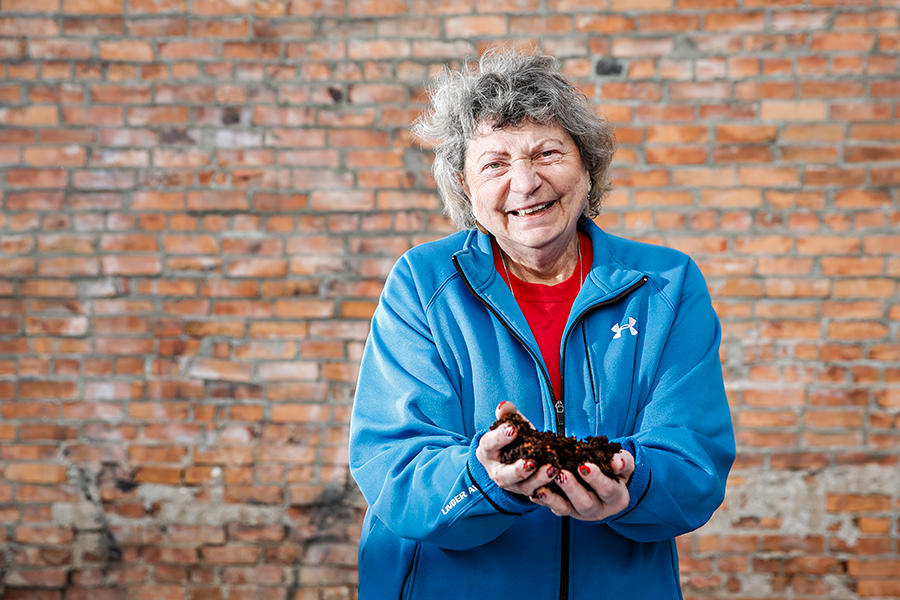2019 Giving Back Issue: Grounds for Growth
Trish Ingvalson has been sharing coffee grounds with amateur gardeners around town for more than a decade, just because she can’t stand to see a good thing go to waste
By Andy Viano
The year Trish Ingvalson moved to Ohio, the Cuyahoga River caught on fire.
The burning oil slicks’ thick flames would come to symbolize industrial recklessness on the Cleveland-area river that feeds into Lake Erie, and eventually be used by the budding environmental movement as an illustration of what the entire planet’s future could look like if polluters and pollutants were left unchecked.
For Ingvalson, who grew up in Black Eagle, Montana on the banks of the Missouri River, the burning Cuyahoga would only strengthen her foundational beliefs, forged years earlier when her family wasted nothing and re-used everything to keep on living when money was scarce.
Years later, Ingvalson was reading a gardening magazine at her house in Kalispell, with a large garden and sizeable compost outside. The magazine recommended taking used coffee grounds, something otherwise headed for the dump, and mixing them with the soil to stimulate growth. Ingvalson tried it, watched it work “like magic,” and instead of brewing large amounts of coffee decided to track down a supplier.
Coffee shops were a logical target, and around 10 years ago Colter Coffee in Kalispell began leaving its used grounds outside the back door for Ingvalson, a retired special education teacher, to pick up. Ingvalson, never wanting to let anything go to waste, would come by every Wednesday and load not just the coffee she needed for her garden but the shop’s entire supply — typically eight or more garbage bags full of grounds every week — and load it into her vehicle. Where some might see a problem, namely pounds more coffee grounds than any one gardener could possibly use, Ingvalson saw an opportunity to help her community.
“Literally, I walked down the street with my dog and if someone’s in their garden I go, ‘Hey!’” Ingvalson said. “Somehow, I don’t know how, every week I got rid of them.”

Ingvalson’s grounds-sharing operation began small, with a group of fellow gardening enthusiasts and friends getting the call for grounds, whether they knew they wanted them or not.
“I don’t know of anybody who has more friends than Trish — she has hundreds of friends,” Mary Jo Gardner, one of those friends, said. “She would just call us and say, ‘I’m bringing you coffee grounds.’ Sometimes it’s not even optional.”
Over time, Ingvalson’s free deliveries extended well beyond even her wide network of friends. Grounds went to Flathead Valley Community College, to a community garden in Kalispell, to middle and elementary schools with gardens on their property, and even to one farmer who traded her compost-ready chicken manure in exchange for grounds. Any grounds that she could not drop off would be left outside her carport, waiting for a gardener in need to come by or call, and anything left over from that would go into Ingvalson’s compost.
Ingvalson, 70, has been slowed slightly by a couple of bouts with cancer in recent years, but even that has only intermittently halted her collections and deliveries. She plans to continue to pick up from Colter as long as they keep making coffee, and her supplies are always available to whoever needs or wants them.
Wasted grounds, were they to be sent to the landfill, are not a threat to the environment in the way that non-biodegradable waste like plastics and other materials are, but Ingvalson’s one-woman conservation effort provides a window into her unique caring and communal spirit. Ingvalson was a special education teacher for 21 years, and Gardner, who was also a teacher, remembers finding notes in her mailbox at work every so often that would let her know a meal was waiting to be picked up at Ingvalson’s house, for no particular reason other than making a friend’s day a little better. And when it comes to conservation, Gardner says, Ingvalson has walked the walk for decades.
“She was a little ahead of the game because it goes back to, ‘You don’t waste anything,’” Gardner said. “Ever since I’ve known Trish, she would try to re-purpose everything she could.”
Ingvalson is a diligent recycler of plastics, glass, cardboard and aluminum — for a spell, she also collected Colter’s used milk jugs and took them to be recycled — and she sees her work spreading coffee grounds much in that same vein. It’s all part of her responsibility, she says, to keep her home state looking the way she remembers it.
“I wonder if going to Ohio and watching a river burn, if that really played a role in some of this,” she said. “I don’t want Montana to ever get that way. When I lived out of state, I missed Montana so much. The blue skies, the rainbow trout, the mountains, everything about it, and I want it to stay that way.”